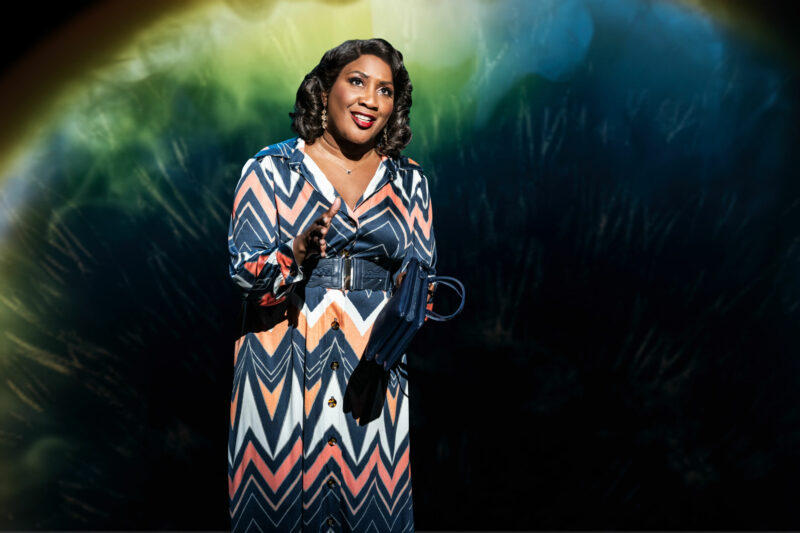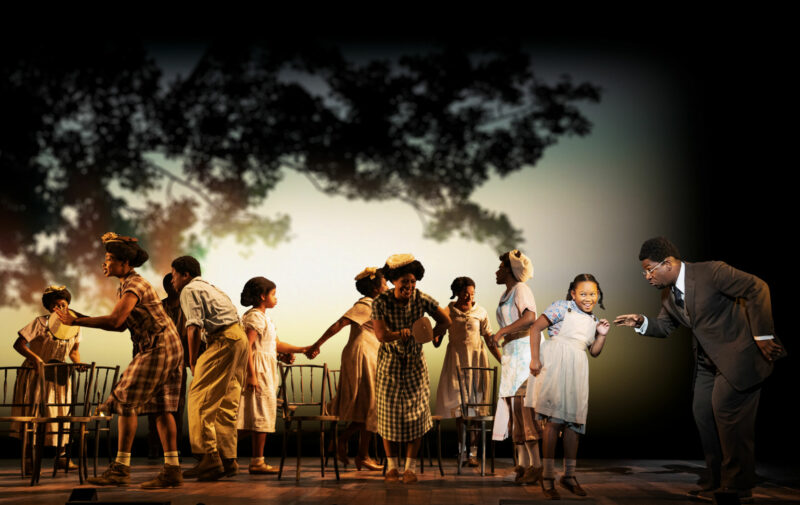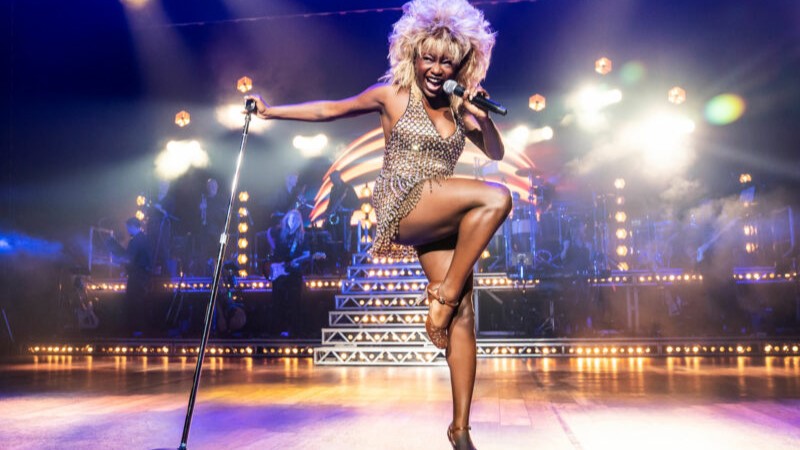SALT LAKE CITY — Dressed in her 1940s Sunday best, actress Nicole Powell crossed down center to address the packed house of the Delta Performance Hall at the Eccles Theatre. In a brief, powerful statement, Powell acknowledged the gravity of the night’s performance. The May 30th show was the first performance of TINA: The Tina Turner Musical since the passing of the legendary queen of rock and roll, Tina Turner. In a statement from the company, Powell solemnly and passionately invited the audience to look to one another to “share the love, respect, and kindness” that Turner emanated and promoted through her life. Given the ruinous experiences she faced and overcame, it was a potent reminder of the power of those things to overcome devastating heartache. After seeing TINA, even the most ardent fans will hear her soulful and rockin’ anthems in a new light.

TINA pulls no punches in unpacking the ugliest parts of Turner’s remarkable life. Within the first five minutes of the play, Tina’s father Richard (played by Kristopher Stanley Ward) and mother (played by Roz White) get into a vicious fist fight that includes the hurling of the n-word and culminates in both walking out on their musically gifted daughter. The play’s heartaches only escalate from there. Much of the play’s dramatic action centers on Tina, who was born Anna Mae Bullock, surviving the blatant infidelity, professional pressure and brutal domestic abuse of Ike Turner, her bandmate-turned-husband. Audience members may expect to see a jukebox musical full of Tina Turner’s poppiest hits with blaring lights and roaring sound. While the show includes that aspect of Turner’s career, the audience has to get to that part of the show the same way Turner did: by passing through her personal hell. The peak of this emotional journey was a battered and broken Tina Turner (played by Naomi Rodgers) pleading center stage with the audience, who serve as a proxy hotel night manager, for a place to stay for the night and mournfully proclaiming that she “Don’t Wanna Fight No More.” It was devastatingly beautiful and brought me to tears.
Rodgers was an incredible proxy for the Grammy-award winning Turner. Rodgers’s stellar portrayal was more than simply matching Turner’s iconic voice. Rodgers was able to portray a sweetness that comes through in little moments with the character. At one point, Tina is chided for seeking to be “sexy” for wearing short skirts. Rodgers was believably indignant when she expressed that she wore the skirts not to be sexy, but rather because she loved her long legs. She was a fiery protector of her children when Ike whipped off his belt to go after her son, Craig (played by Andre Hinds). Throughout the performance, Rodgers balanced the complex sides of Turner: her tenderness and toughness, her strength and vulnerability, and juxtaposed jubilant dancing with bitter sorrow in her lowest moments. I will always be on the lookout for Rodgers to return to Broadway stages.

Lawrence portrayed Ike’s character arc so vividly that it felt like Lawrence had lived through the whole thing. In the beginning Lawrence played Ike as a charismatic playboy who had an eye for talent. He was likable, which made his lightning quick turn to a temperamental control freak so grievous. When Turner has the audacity to suggest the tempo to which she might sing or dance Lawrence degrades her calling her “heffer” and “bitch,” eventually throwing a drum cymbal with such force that it warps. Shortly after the two later marry, Ike later engages in lewd acts with other literally behind Tina’s back as she sings on stage, and in full view of the audience. He browbeats her for seeking the most modest of reprieve. Through all of this, Lawrence stays grounded enough to not become a mustache twirling villain, but instead a nightmarish presence in each scene he appears in. His progressive descent into a total narcissist made his very presence on stage hair-raising and made it difficult to applaud his commendable performance at his final bow.
Production stage manager Larry Smiglewski ran an incredibly tight show. That is easier to do with a cast as talented as this and a technical slate that was brilliantly designed, but the show was executed seamlessly. Turner’s suicide attempt was an incredible staging (by director Phyllida Lloyd) and design effort to pull off. Projected in the back were psychotropic color patterns as Rodgers’s body ramps up and shuts down. It shifts immediately to a hospital scene where Turner is surrounded by doctors who assist her in a quick change that was as powerful as it was efficient. So many onstage costume changes were planned and executed with great skill. The transitions of set and costumes (both designed by Mark Thompson) were so crucial to performing a story like this that spans decades and features famous Turner outfits. Doing this so expertly for a show that must change venues nearly every week was a huge credit to Thompson, who did not have a misfire in any of this work.

So much of what worked for the show involved the support of a strong ensemble. The cold casualty of cast members who had to taunt Turner, utter racial epithets, and watch as bystanders to viscous staged violence was a collective commitment to telling a story that could not shy away from its themes. The live orchestration was phenomenal and set a great tone for the show from gospel choir start, to rockin’ encore finish. In what appeared to be an inspired tribute, after the bows had been taken, Rodgers invited the standing, raucous audience to a special two song encore set to celebrate the life of Turner. The songs were choreographed, with full lights and spectacle, and added a punch of celebration at the end of a heart wrenching story.
Tina Turner is a mega celebrity with adoring global fans and an impressive slate of awards and accolades. She is in elite company as one of just twenty-six artists to ever have been enshrined twice into the Rock and Roll Hall of Fame. I can understand the need to celebrate her more than once. The star power of this production is an emphatic exclamation mark tribute to her timelessness. It was “Simply the Best.”
[box]The national tour of TINA: The Tina Turner Musical plays Tuesdays through Thursdays at 7:30 PM, Fridays at 8 PM, Saturdays at 2 PM and 8 PM, and Sundays at 1 PM and 6:30 PM at The George S. Dolores Doré Eccles Theater (131 Main Street, Salt Lake City). Tickets are $50-194. For more information, visit saltlakecity.broadway.com.[/box]

